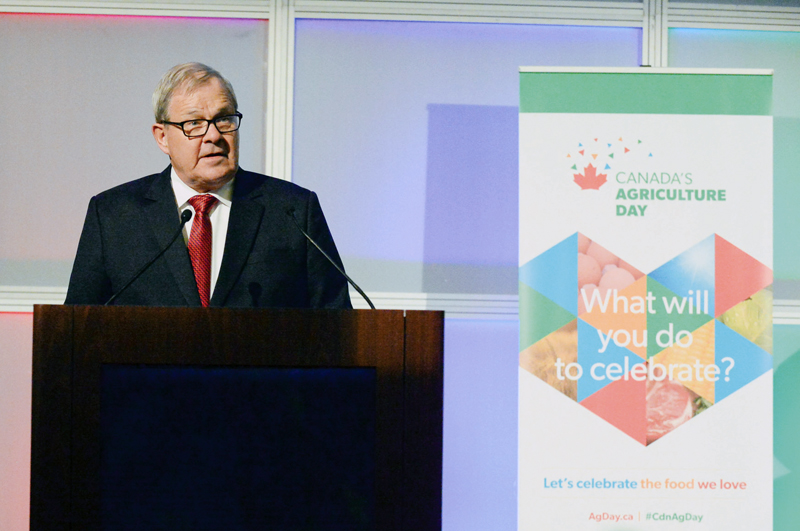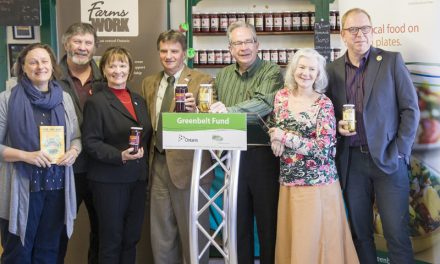Minister’s announcement
Federal Agriculture and Agri-Food Minister Lawrence MacAulay spoke at the Canada’s Agriculture Day conference at the Westin Hotel in Ottawa on Tues., Feb. 13, where he announced significant funding to grow the agricultural and agri-food sectors. Courtesy photo
by Candice Vetter
AgriNews Staff Writer
OTTAWA – Federal Agriculture and Agri-Food Minister Lawrence MacAulay made an announcement of significant funding at the Canada’s Agriculture Day conference at the Westin Hotel in Ottawa on Tues., Feb. 13.
He told conference attendees from across the country that the federal government is allocating $3-billion in funding over the next five years to grow the agricultural and agri-food sectors.
Over $1-billion of the $3-billion investment will support activities in six federal programs: AgriMarketing, AgriCompetitiveness, AgriScience, AgriInnovate, AgriDiversity and AgriAssurance.
On April 1, agriculture ministers from across Canada will launch the Canadian Agricultural Partnership, described as “our shared vision for the future of this great sector.” The partnership is a progressive federal-provincial-territorial agreement that will help chart the course for government investments in the sector over the next five years. Developed with input from provincial and territorial partners, as well as industry, activities will support three key areas: growing trade and expanding markets, innovation and sustainable growth for the sector, and supporting diversity and a dynamic, evolving sector.
MacAulay said the federal government is currently working with the provinces and territories to agree on the shape of the cost-shared portion of the partnership, and just that day an agreement had been reached with the Government of Ontario. He also said great progress was being made towards reaching agreements with the other provinces and territories.
“And today,” said MacAulay, “I’m proud to announce that these programs are now open for business. As of this moment, we are going live.”
He said application forms and guidelines are available online now, in order to give the industry time needed to submit applications. That way activities can start as soon as possible after April 1.
“Agriculture is booming,” MacAulay said. “Canada’s hardworking farmers and food processors are the backbone of the economy, and that’s how our government wants to keep it.”
MacAulay was a farmer in dairy and potatoes in Prince Edward Island. “You have to innovate,” he said. “It might just be a small innovation, but you have to improve.”
He described the agricultural and agri-food sector as “booming,” and said it is a powerful driver of jobs and middle-class prosperity. Last year, the agriculture and food system contributed over $100-billion to the Canadian economy. Agriculture and food exports are growing by 10 per cent per year, and last year hit a new record of $62-billion. Net cash income in the sector topped $16-billion, a new record. “At the foundation of this economic engine are almost $200,000 producers and thousands of SMEs,” he said.
MacAulay gave a few examples of innovation. “In PEI, a potato farmer has invented a way to sample the soil in his fields – on-the-go. That saves him time and money. In Quebec, a young farm parent has harnessed the internet to get out the positive word on farming. In Saskatchewan, two farmers have invented a machine that does everything a tractor does – and more – without a driver. And in British Columbia, a farmer is using a robot to check the health of his greenhouse vegetables. I know that we could come up with hundreds of more examples, just in this room. Farmers aren’t standing around waiting around for the future. They’re out there creating it themselves. And that’s a big reason why Canadian agriculture is booming right now.”
He also said the government has set a target of $75-billion in ag exports by 2025. “The programs we are launching…will help the sector sell more products, and help showcase Canada’s reputation.”
Many of the conference speakers focused on science and innovation. As MacAulay said, “Strong trade depends on strong innovation. To compete in today’s global market – you’ve got to innovate. That’s why our programs will have a strong focus on innovation.”
He also said the new science clusters will bring industry and scientists to the table to ensure Canadian science is hitting the target. The clusters have already helped farmers boost their bottom line with: higher-yielding crops, better animal health and welfare; and new uses for agricultural crops.
The new programs are predicted to help farmers adapt to climate change, conserve water and soil, and grow their businesses to feed the world sustainably. They should also help get science from the lab and into the field as quickly as possible.
Examples he used were a food processor installing new high-tech equipment to grow its business and boost farmers’ sales, or programs could support new technology for growing vegetables in Northern Canada, which would open new business opportunities and strengthen food security for the North.
The programs will have a new and fresh focus on public trust, diversity, and regional collaboration. According to a survey commissioned by his department last March, 91 per cent of Canadians who responded said they trust information coming from farmers and ranchers. The new partnership will be the first policy framework to explicitly recognize support public trust as a priority in agriculture.
He praised the Ag More than Ever campaign and similar other campaigns for doing a great job of getting the message out through social media. “We will help farmers tell Canadians about the great things they are doing to grow safe, high-quality food; care for their animals; and safeguard our environment.”
The programs are also breaking new ground with a strong focus on diversity, so the Government will reach out to women, Indigenous communities and young people. “It’s important that we remove any barriers that are preventing these groups from taking up a leadership role in the sector,” he explained. “For example, funding would be available to help young farmers strengthen their leadership skills to take the industry into the future. Or it could help Indigenous peoples get access to programs. And for the first time, the partnership includes measures that enable provinces and territories to increase collaboration on regional initiatives to address common challenges and priorities, including environment, climate change and innovation.”
He urged conference attendees to go online and take a look at the new programs, and see where there’s a fit for a business or an organization.
He closed by saying the future of the industry has never been brighter. “The global middle class is growing, and they are hungry for our top-quality food. There is a world of opportunity out there for Canadian farmers and food processors. We have the resources – our productive farmland and our fresh, clean water. We have the know-how, right across Canada – and right here in this room. And with the new programs available today under the Canadian Agricultural Partnership, we have the tools we need. That’s a winning combination to keep Canadian agriculture out in front.”













